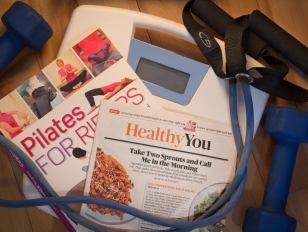
When the calendar flips to a new year, many people see a clean slate. The new year is a land of new beginnings, an expanse of unmarred days waiting to be filled with beautiful new habits—exercising four to five times a week, forgoing desserts, saving money, or giving up smoking or drinking or whining or...
By the end of January, however, that clean slate often looks a little dingy, as those New Year’s resolutions crumble and, in some cases, disappear altogether. This isn’t surprising. Studies have shown that roughly 80 percent of New Year’s resolutions fail, most of them by mid-February.
Why Do We Make Resolutions?
“It’s part of our culture to want to improve,” said Stephani Foraker, Buffalo State College associate professor of psychology and cognitive psychologist. “The beginning of a new year is a nice landmark for turning over a new leaf, and somehow it seems easier to leave things behind that we don’t like or aren’t proud of. Psychologically, it feels as though you can start afresh.”

“It’s part of our culture to want to improve.”
Stephani Foraker, Ph.D., Associate Professor of Psychology
Foraker said resolutions probably hark back to old cultural traditions where individuals believed that if they did something better, through some sort of magical thinking, good things would happen to them.
In fact, the ancient Babylonians are said to have been the first people to make New Year’s resolutions, some 4,000 years ago. They made promises to the gods to repay their debts in hopes that the gods would bestow favors on them in the coming year.
“Certainly, in today’s society, we use New Year’s resolutions to become better people, be happier with ourselves and prouder of our good qualities,” Foraker said. “Often, eating healthier—or framed more negatively, cutting out sugar and junk food—is a perennial favorite, along with losing weight and saving money. These are core behaviors that could help us in many aspects of our lives and are big-picture issues.”
However, big-picture goals often fail if they are too nebulous.
Making Resolutions That Stick
Want to keep your resolutions and reach your goals? Whether you wrote them down on January 1 or are thinking about ways to improve your life right now, make them specific, Foraker said.
She points to the SMART goals heralded by business leaders. The acronym stands for specific, measurable, achievable, relevant, and time bound.
“Measurable and achievable are important,” she said. “You want to lose weight. Is that 5 pounds or 50? And how long do you think that will take?”
To find success, she said, start with a specific, realistically achievable goal and chip away at it.
“Many individuals, especially young people, often make their goals too big and unrealistic,” Foraker said. “If you say you’re going to exercise every day for 30 minutes or two hours a day three times a week when you haven’t been exercising at all, it’s going to be too hard.”
Also, keep in mind that it takes 21 days to form a new habit—if you’re engaging in the new activity every day, Foraker said. If it’s something you’re only doing every week or a couple of times a month, it could take 10 months or longer to make the new habit part of your reality.
Another tip, she said, is to make a desired habit automatic, so you don’t have to stop and make a choice. For instance, fill your fridge and pantry with only healthful foods so those cheesy potato chips don’t tempt you. Likewise, automatically funnel money from each paycheck into a savings account and schedule regular workout times with a buddy you won’t back out on.
“When we’re building a happy, full life, we’re always squeezed for time and energy,” she said. “Lifestyle changes are not going to come easily. Make it as easy on yourself as possible.”
From a cognitive perspective, she added, framing changes in a positive way is more successful than giving something up.
Instead of vowing to stop eating junk food, decide to have vegetables with at least three meals a week and initiate a meatless Monday.
“It feels rewarding when we achieve the positive goal,” she said.
One Habit That Enables Other Good Habits
One crucial habit to integrate into your life, Foraker said, is getting enough sleep.
“If you get an adequate amount of sleep and better-quality sleep, research shows, you’re more apt to lose weight. You’re eating earlier in the day and choosing better foods,” she said. “You also have more energy to exercise and a better mood overall. Start with getting two more hours of sleep per week and see how you do in other areas of your life.”
Although Foraker said she hasn’t made New Year’s resolutions in a while, she follows a five-year plan for self-improvement.
“If you’re a homeowner you know, you’re never done with a house. Something always needs fixing,” she said. “That’s kind of how I am, too. There are different areas I work on every year.”
She suggested checking your resolutions or goals at least once a month and thinking about what success means to you.
“Sometimes we aspire to a habit or goal that other people think is possible, but it’s not exactly what we want to do,” she said. “Ask yourself if you’re personally invested in the goal and not doing it just to look cool. If it’s the latter, it probably won’t stick.”
Suggested Readings (Foraker’s Picks)
Making Habits, Breaking Habits: Why We Do Things, Why We Don't, and How to Make Any Change Stick, by Jeremy Dean (2013: Da Capo Lifelong Books)
The Power of Habit: Why We Do What We Do in Life and Business, by Charles Duhigg (2012: Random House)
Better Than Before: What I Learned about Making and Breaking Habits—to Sleep More, Quit Sugar, Procrastinate Less, and Generally Build a Happier Life, by Gretchen Rubin (2015: Broadway Books)
Photo illustration by Bruce Fox, campus photographer.



